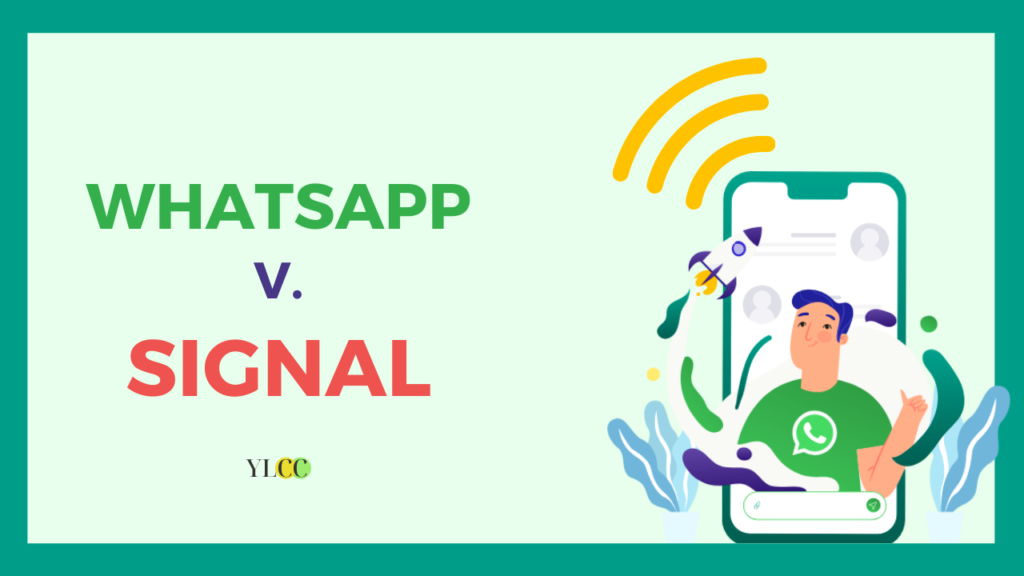
Whatsapp has recently made headlines for its controversial privacy policy revamp which proposed sharing user data with Facebook and other subsidiaries of the tech giant. With Hike withdrawing from the Indian market and with a reach of close to 400 million active users, Whatsapp is considered to be well on its way towards creating a monopoly in the instant messaging sector. However, privacy concerns seem to have derailed the growth trajectory and provided impetus to competitors like Telegram and Signal.
In this article, we objectively examine Whatsapp and Signal on the most important parameters:
Security
For a multitude of users across the globe, security and privacy of their data is of paramount importance. Needless to say, many would base their choice of platform on how secure it is from foreign access.
- Whatsapp uses what is known as E2E or End To End encryption. In simple words, this means that all communication done via the platform (messages, calls, photos, videos, voice notes, etc.) can be read only by the sender and the receiver.
- No other entity, including Whatsapp, will be able to intercept such communication, thereby keeping your data private.
- However, it is to be noted that although all communication is said to be encrypted, Whatsapp does not encrypt local or cloud backups.
- Metadata (which indicates whom and when you have spoken with and how long) is also not encrypted.
These two premises have attracted brutal criticism from analysts who fear user data being exploited for revenue.
Signal
- Signal is, by far, unrivalled when it comes to security. The platform uses an effective, open source Signal Protocol that is quite similar to Whatsapp’s End To End Encryption.
- Needless to say, all communication is encrypted.
- Here is where it gets better: Signal by encrypts local back-ups with a 4 digit-passcode as well as the metadata.
- Moreover, it has additional features like Sealed Sender through which the identity of the sender and receiver is completely secret, even to platform administrators.
- Other features include preventing screenshots within the app and blurring faces in pictures.
Features
Features that augment the utility of an application is perhaps the most important factor to be considered. For instant messaging services too, users look for a plethora of features that makes it a wholesome experience.
- Whatsapp provides a variety of features which include voice calls, video calls (for upto 8 members), texting, media exchange- almost everything that you might require. Groups can accommodate upto 256 members.
- The Broadcasting feature allows you to broadcast the same message to multiple contacts at once.
- The Stories feature is unique to Whatsapp- none of its competitors have it. It allows users to share updates from their lives in the form of text, photos, and short videos.
Signal
- Compared to Whatsapp, Signal falls short on some features, although most basic features that users expect have been included.
- Features like Broadcasting messages are missing, so is the extensive collection of emojis and stickers.
- Notably, Signal allows you to include upto 1000 members in a single group.

Ownership
It is common knowledge that the actions and ideology of a company depend largely on its ownership. This is useful information to consider while choosing a platform.
- Whatsapp is owned by Facebook and critics now believe that the company is targeting user data more aggressively for marketing purposes.
- The company has also had its share of allegations for breaking encryption and creating backdoor for monitoring by government agencies.
- For now, Whatsapp has kept its revised privacy policy optional in the face of massive criticism.
Signal:
- Signal is owned and run by the non-profit Signal Foundation, run by cryptographer Moxie Marlinspike and Brian Acton.
- Notably, Brian Acton is the co-founder of Whatsapp and left the company 3 years after Facebook acquired Whatsapp.
- The Signal Foundation is run by donation and grants from several organisations across the globe.
- It has been expressly supported by eminent personalities such as Edward Snowden, the American whistleblower and Jack Dorsey, the CEO of Twitter.
In conclusion, both platforms have their pros and cons. From a strictly privacy-centric perspective, Signal is superlative as it prioritises security over features. However, the reality remains that Whatsapp continues to be the most popular choice for rural as well as urban societies in India, leading one to infer that utility, and not privacy, drives the average Indian.
YLCC would like to thank Sachet Labroo for his valuable inputs in this article.






